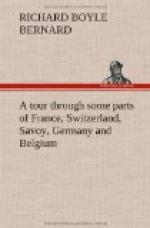As I had by this time pretty well satisfied my curiosity, in visiting the objects in Paris that principally arrest the attention of a traveller who has not leisure to dwell longer than is indispensable in one place, I began to be impatient to exchange the continual bustle of that city—its
“Fumum opes strepitumque,”
for those romantic and enlivening scenes in which Switzerland stands without a rival, and is, as it were, by acclamation, allowed to surpass the other countries of Europe.
I therefore attended at the office for foreign affairs, and obtained the signature of the Prince of Benevento (for about ten francs) in addition to the signature of our own distinguished minister, Lord Castlereagh. I was told it was necessary also to have my passport visited by the police before leaving Paris; and my landlord offered his services to arrange that affair for me. I however recollected Dr. Franklin’s maxim, “If you would have your business clone, go; if not, send,” and went accordingly to the office myself.
These affairs being arranged, so as to permit my passing without molestation through the interior of France, I quitted Paris without any sensations of regret at leaving a place which, highly as I had been pleased with many of the great objects which it contains, I cannot but consider, when curiosity is once gratified, to be an unpleasant residence. I took the road to Fontainbleau, distant about thirty-seven English miles; a place formerly only remarkable for its castle, situated in a forest of about 30,000 acres, and often visited by the Kings of France, for the amusements of the chace; but which will hold in history a distinguished page, and be visited in future ages as being the scene where it pleased Providence to terminate a tyranny unexampled in the history of the world. It is worthy of remark, that in this very castle, in which the venerable Head of the Romish Church was so long and so unjustly detained a captive, his once formidable oppressor was obliged to abdicate that authority which




